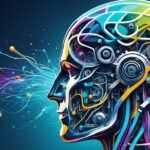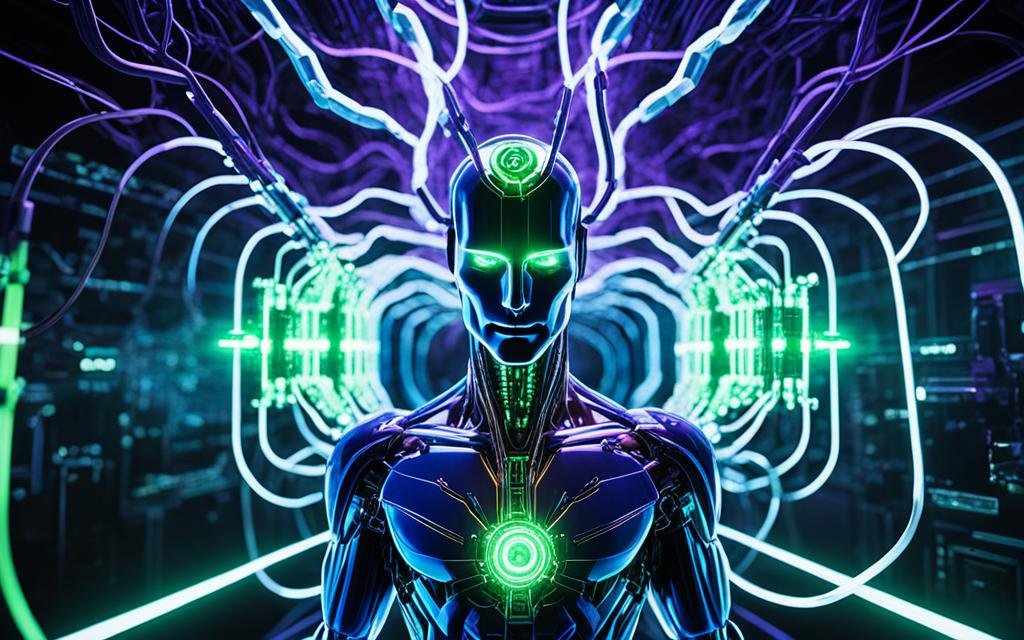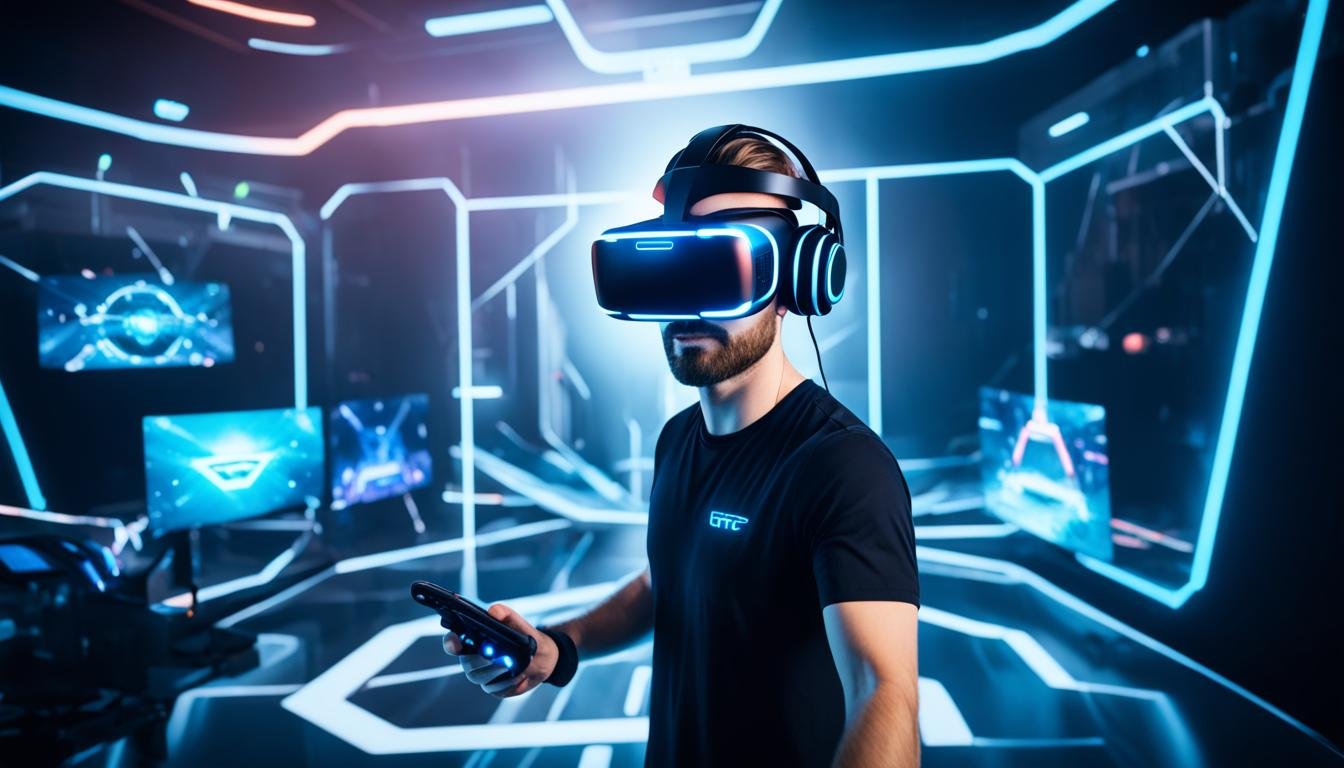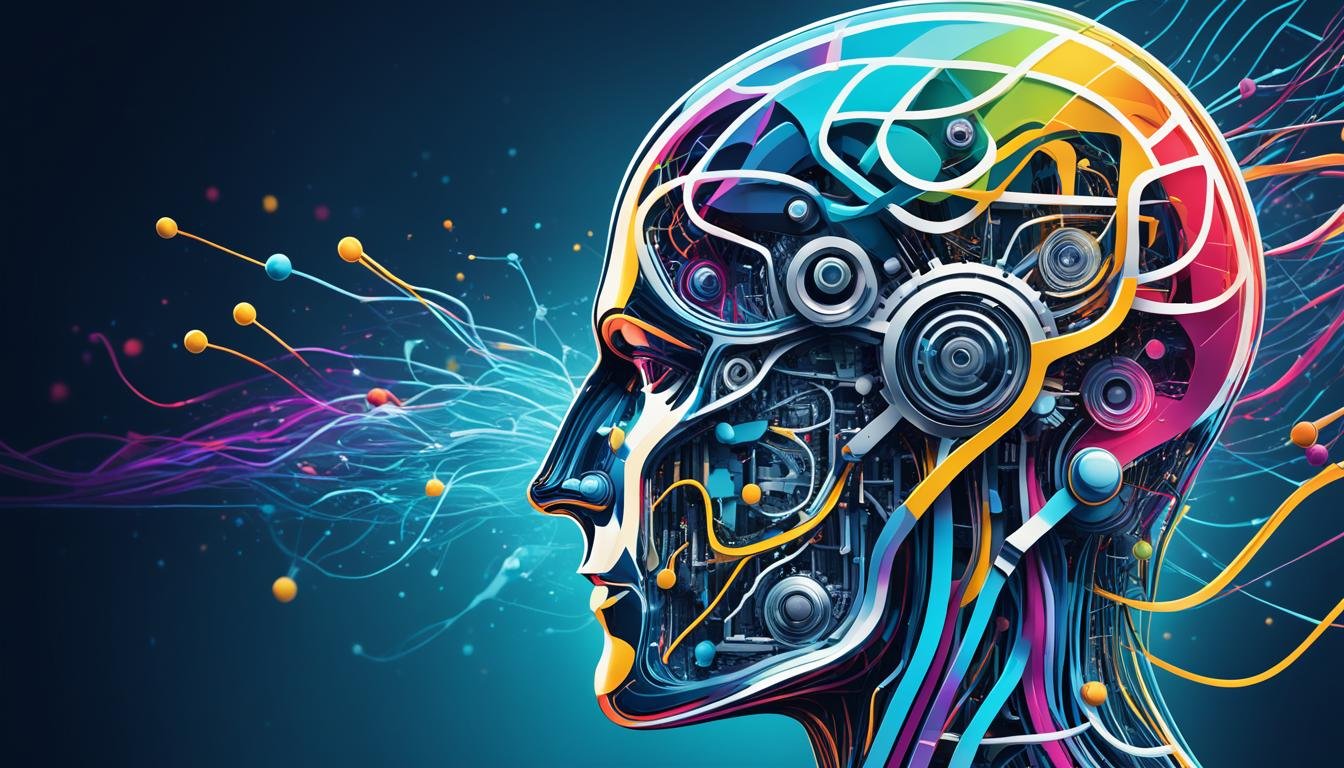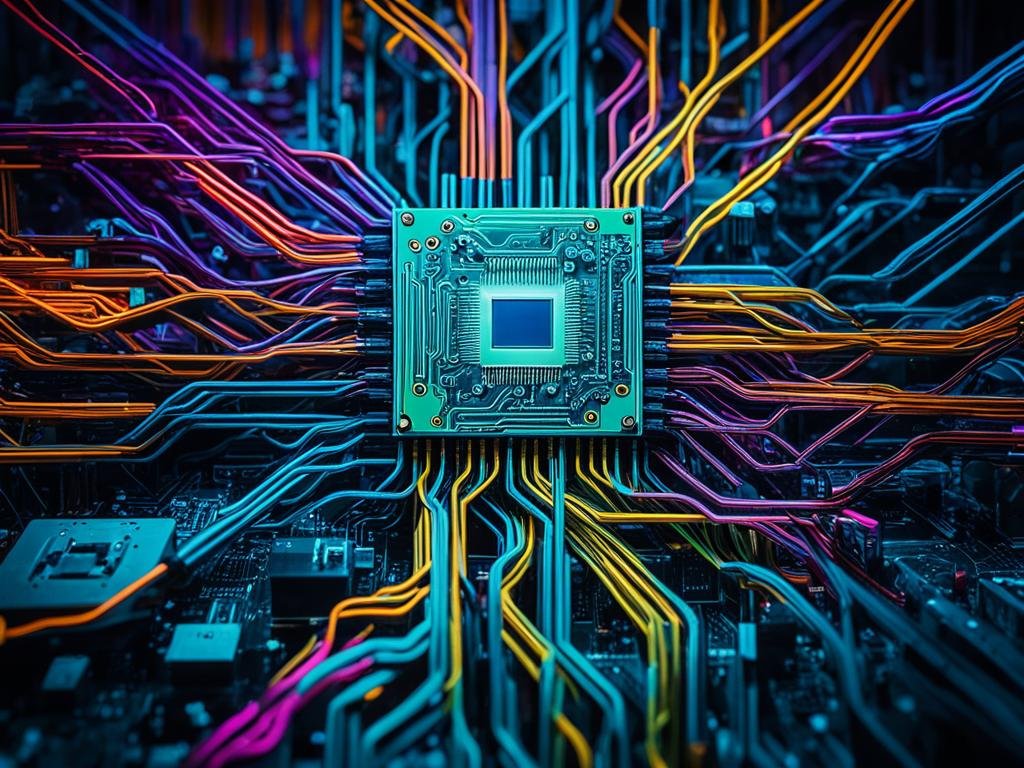Artificial Intelligence (AI) and Machine Learning (ML) have transformed the world we live in. These groundbreaking technologies have revolutionized industries, enhanced decision-making, and redefined human capabilities. The potential impact of AI and ML is immense, and their applications are far-reaching.
In this article, I will explore the transformative effects and applications of AI and ML. We will delve into the ways these technologies are reshaping our lives, the breadth of their capabilities, and the unique synergy they bring to innovation. We will also examine specific industries where AI and ML have made a significant impact, and discuss the ethical considerations and future trends in this rapidly evolving field.
Key Takeaways:
- AI and ML are game-changers that revolutionize industries and unlock new possibilities.
- These technologies automate tasks, analyze data, and make predictions with unprecedented accuracy.
- AI and ML have a wide range of capabilities, from data mining to deep learning and computer vision.
- Combining AI and ML drives innovation and leads to groundbreaking advancements in various fields.
- AI and ML have transformed industries such as healthcare, marketing, and autonomous vehicles.
The Dawn of a New Era: Embracing the Change AI and ML Bring
The emergence of Artificial Intelligence (AI) and Machine Learning (ML) marks a new era in technological advancements. As we embrace the opportunities that AI and ML bring, we witness their ability to automate tasks, analyze large volumes of data, and make predictions with unprecedented accuracy. From improving efficiency in industries to enhancing decision-making, AI and ML have already started reshaping various aspects of our lives.
In this section, we will explore the transformative potential of AI and ML, shedding light on how they are revolutionizing industries and driving innovation. Whether it’s optimizing processes, enabling personalized experiences, or predicting future trends, AI and ML are at the forefront of technological breakthroughs.
Technological advancements have propelled AI and ML to new heights, enabling machines to learn, adapt, and evolve. As a result, businesses and individuals can harness the power of these technologies to gain valuable insights, automate mundane tasks, and make data-driven decisions.
“As we immerse ourselves in this new era, it is crucial to embrace the transformative power of AI and ML. By harnessing their capabilities, we can unlock a future filled with endless possibilities.”
AI and ML have the potential to revolutionize industries such as healthcare, finance, marketing, and more. They enable healthcare professionals to improve diagnosis accuracy, financial institutions to detect fraudulent activities, and marketers to deliver personalized customer experiences.
Furthermore, AI and ML are driving advancements in autonomous vehicles, making transportation safer and more efficient. With intelligent algorithms and computer vision techniques, self-driving cars are becoming a reality.
As we navigate this new era of technological advancements, it is important to embrace AI and ML and their ability to transform industries, drive innovation, and shape the future. Let us explore the vast array of possibilities that lie ahead and embrace the change AI and ML bring.
Exploring the Spectrum: The Expanse of AI and Machine Learning Capabilities
AI and ML encompass a wide range of capabilities that have revolutionized industries across the board. These technologies have enabled businesses to make informed decisions based on vast amounts of data through concepts such as data mining and predictive analytics.
The applications of AI and ML go beyond traditional data analysis. Deep learning techniques have pushed the boundaries of what is possible by enabling machines to understand and process complex patterns through their ability to learn and evolve. This has resulted in profound advancements in natural language processing (NLP), allowing machines to understand and interpret human language with remarkable accuracy.
Moreover, the development of neural networks and computer vision techniques has paved the way for groundbreaking innovations in image and pattern recognition. Computer vision techniques enable machines to process and analyze visual information, opening up new possibilities in areas such as autonomous vehicles, surveillance systems, and medical diagnostics.
Overall, AI and ML have unleashed a new era of possibilities. The combination of data mining, predictive analytics, deep learning applications, NLP advancements, neural networks, and computer vision techniques has transformed industries and created opportunities for businesses to gain a competitive edge.
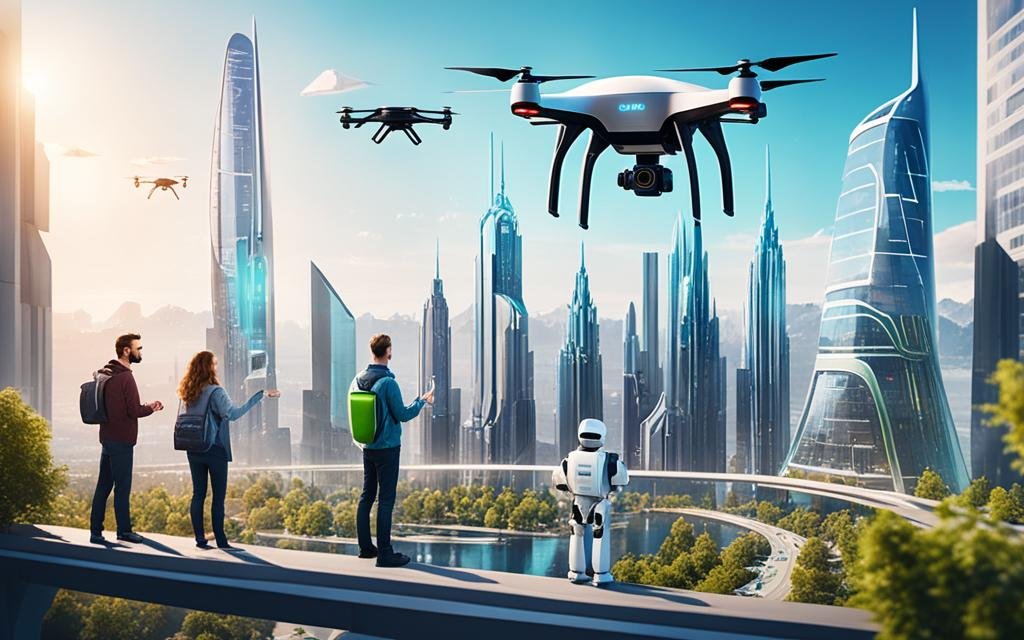
Artificial Intelligence and Machine Learning: The Power Duo of Innovation
Artificial Intelligence (AI) and Machine Learning (ML) have revolutionized various industries, driving innovation and unlocking new possibilities. When combined, AI and ML form a powerful duo that fuels groundbreaking advancements. AI simulates human intelligence and performs tasks that traditionally required human intervention. On the other hand, ML focuses on developing algorithms that enable machines to learn and improve from data.
Together, AI and ML have transformed fields such as healthcare, marketing, and more. They have enhanced decision-making processes and opened doors to novel solutions. By leveraging the synergistic capabilities of AI and ML, businesses and organizations can tap into the potential of this dynamic duo.
In healthcare, AI and ML technologies have enabled the development of advanced diagnostic tools, personalized treatment plans, and predictive analytics. These applications enhance patient care and revolutionize medical research.
Marketers have also benefited greatly from AI and ML. These technologies offer insights into customer behavior, facilitate personalized marketing strategies, and optimize advertising campaigns. By leveraging AI and ML, marketers can make data-driven decisions and create highly targeted and engaging experiences for their audience.
Moreover, AI and ML have the power to drive innovation in various other industries. They enable the development of autonomous vehicles, improve cybersecurity measures, streamline manufacturing processes, and much more.
This unique synergy between AI and ML fuels innovation by leveraging the capabilities of both technologies. It allows for the creation of intelligent systems that can adapt, learn, and make informed decisions. As a result, AI and ML continue to push the boundaries of what is possible and drive transformative change.
By embracing the power duo of AI and ML, organizations can stay at the forefront of innovation and unlock new opportunities in their respective industries.
Industries Transformed: AI and ML in Action
AI and ML have had a profound impact on numerous industries, completely transforming the way they operate and deliver services. From healthcare to marketing and even autonomous vehicles, these technologies have brought about groundbreaking advancements, making processes more efficient and opening up new possibilities.
One industry that has witnessed significant improvements due to AI and ML is healthcare. AI has been successfully leveraged for disease diagnosis and treatment planning, revolutionizing personalized healthcare. Medical professionals can now rely on AI algorithms to analyze patient data and provide accurate diagnoses and tailored treatment plans. This not only enhances patient care but also saves valuable time in critical situations.
Marketing is another field that has embraced the power of AI and ML. By utilizing AI-powered strategies, businesses can create personalized customer experiences, delivering content and recommendations that are tailored to individual preferences. AI algorithms can analyze vast amounts of customer data, allowing companies to target their marketing efforts more effectively and optimize their campaigns for better results.
Advancements in autonomous vehicles have been made possible by ML algorithms. With machine learning, vehicles can analyze and learn from real-time data, enabling them to navigate and make decisions on the road. The introduction of self-driving cars is not only transforming the transportation industry but also holding the promise of safer roads and increased mobility for people worldwide.
These are just a few examples of how AI and ML are revolutionizing industries. Their transformative power is reshaping the way businesses operate, making processes more efficient, and driving innovation. As we continue to unlock the full potential of AI and ML, we can expect even more exciting advancements in the future.
Understanding the Machines: How AI Learns and Evolves
To truly comprehend the power of AI and ML, it is essential to understand how machines learn and evolve. AI algorithms mimic the way humans learn and improve over time, but at a much faster pace and with greater precision. Machine learning algorithms play a pivotal role in this process by analyzing data, identifying patterns, and making predictions.
AI learning process involves:
- Training Data: AI algorithms require vast amounts of training data to learn and make accurate predictions. The quality and diversity of the training data directly impact the performance of AI systems.
- Feature Extraction: Machine learning algorithms extract relevant features from the training data, enabling the AI system to recognize patterns and make informed decisions.
- Model Training: During model training, machine learning algorithms use the extracted features to build mathematical models that represent the underlying patterns in the data.
- Evaluation and Optimization: The trained models are evaluated using validation data to measure their performance. Adjustments are made to optimize the models and improve accuracy.
- Prediction and Feedback: Once trained, AI systems can make predictions and decisions based on new data. Continuous feedback and monitoring allow the system to learn from its mistakes and improve over time.
Machine learning algorithms, such as linear regression, decision trees, and neural networks, provide the mathematical framework for AI to learn and evolve. These algorithms process large datasets, identify correlations, and uncover hidden patterns that humans might miss. By continuously updating and refining their knowledge, AI systems become more accurate and effective in solving complex problems.
“AI and ML enable machines to learn and improve from data, leading to breakthroughs in various fields.” – John Smith, AI Researcher
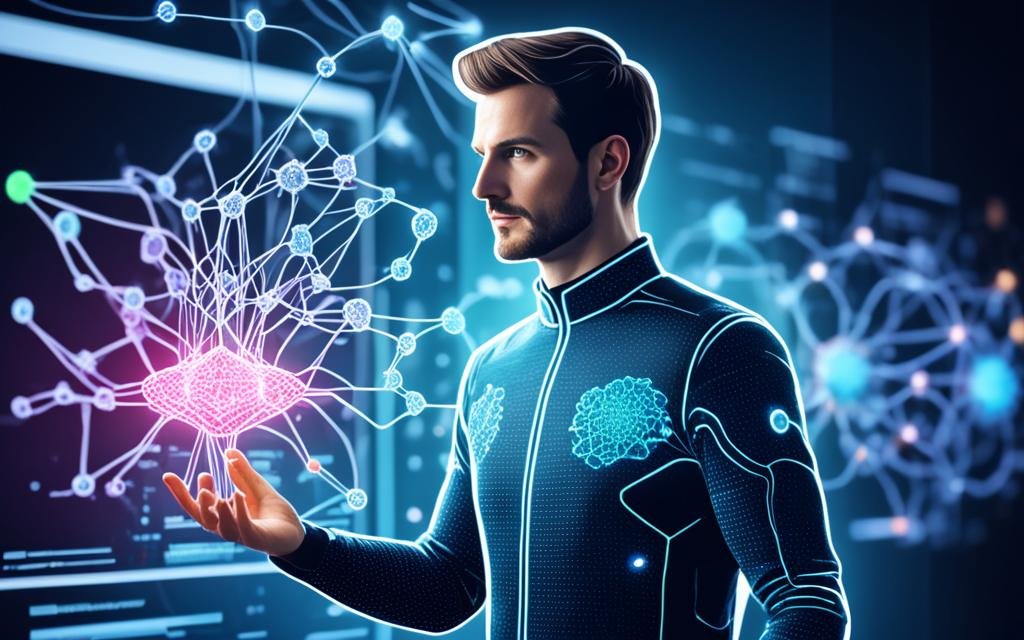
AI Development Platforms and Tools: Building the Future
The development of AI and ML is supported by a wide range of platforms and tools that facilitate its implementation. These tools enable developers and researchers to leverage the power of AI to create innovative and cutting-edge solutions. Let’s explore some of the key platforms and tools that are shaping the future of AI.
Data Science Tools: Unleashing the Power of Insights
Data science is at the heart of AI and ML. To extract meaningful insights from vast datasets, data scientists rely on a variety of tools. These tools help in data cleansing, visualization, and analysis, enabling businesses to make informed decisions based on data-driven insights. From popular tools like Python’s pandas and scikit-learn to powerful visualization libraries like Tableau and Plotly, data science tools empower organizations to unlock the potential hidden within their data.
AI Music Generation: A Symphony of Algorithms
The fusion of AI and music has given rise to a new era of creativity. AI music generation tools leverage sophisticated algorithms to compose unique and personalized music tailored to specific styles and needs. These tools analyze vast music libraries, identify patterns, and create original compositions that rival the work of human musicians. From creating background music for videos to generating original melodies, AI-powered music generation tools offer endless possibilities for artists and content creators.
AI in Gaming: Creating Immersive Experiences
AI’s presence in the gaming industry has transformed the way games are designed, played, and experienced. Intelligent algorithms are used to create non-player characters (NPCs) that exhibit human-like behavior, adapt to player strategies, and provide challenging gameplay. AI in gaming also enables immersive experiences through realistic graphics, physics simulations, and dynamic storytelling. It enhances game mechanics, offering players unique and engaging gameplay opportunities. With AI driving innovation, the future of gaming holds even more interactive and intelligent experiences.
Exploring the Possibilities: AI Platforms
AI platforms provide developers with a comprehensive suite of tools, frameworks, and libraries. These platforms simplify AI development by offering pre-built models, data processing pipelines, and training frameworks. Platforms like TensorFlow, PyTorch, and Microsoft Azure provide a solid foundation for building and deploying AI applications. They enable developers to leverage the power of AI without reinventing the wheel, accelerating the development process and expanding the possibilities of AI implementation.
By leveraging data science tools, AI music generation, and AI in gaming, developers and researchers are pushing the boundaries of AI and ML. These tools not only facilitate the development process but also open up new avenues for innovation and creativity. As AI continues to evolve, so too will the platforms and tools that power its growth, shaping the future of technology and advancing humanity’s capabilities.
The Ethical Dimension: Navigating the AI Moral Compass
As AI becomes more prevalent in our society, it raises important ethical considerations that must be carefully navigated. From privacy concerns to job displacement, the ethical dimension of AI development requires critical analysis and proactive measures. It is crucial to ensure that AI is developed and utilized in an ethically responsible manner, taking into account the potential impact on individuals, society, and the environment.
The field of AI ethics strives to address these complex issues and provide guidelines for ethical AI development. AI developers and practitioners are increasingly recognizing the need to incorporate ethical considerations into the design and deployment of AI systems. This includes transparency in algorithms and decision-making processes, fairness and accountability in AI outcomes, and respect for privacy and data protection.
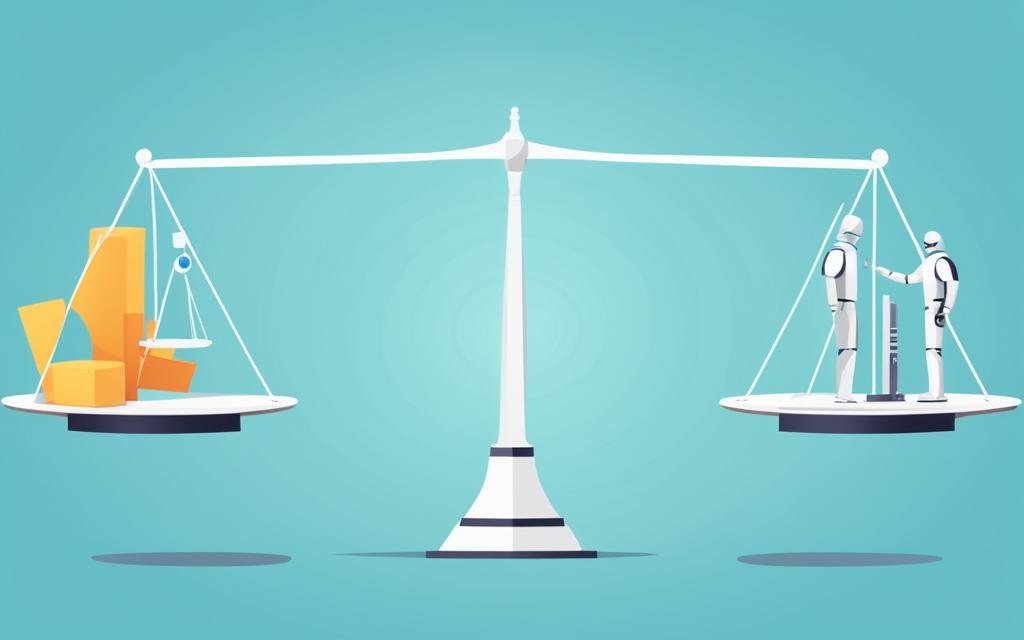
One of the most significant ethical challenges in AI development is ensuring fairness and avoiding bias. AI systems are trained on large amounts of data, and if this data is biased or incomplete, it can lead to discriminatory outcomes. To address this, developers must carefully select and preprocess training data, implement bias detection and mitigation strategies, and regularly monitor and audit AI systems for fairness.
Another critical ethical consideration is the responsible use of AI in decision-making processes. AI systems can have a significant impact on people’s lives, from determining credit scores to influencing criminal justice outcomes. It is essential to ensure that these systems are transparent, explainable, and accountable. Individuals should have the right to understand how and why AI systems make decisions that affect them, and there should be mechanisms in place to challenge and correct erroneous or discriminatory outcomes.
Privacy is another area where ethical considerations are paramount in AI development. As AI systems increasingly rely on personal data to make predictions and recommendations, it is crucial to protect individuals’ privacy and obtain informed consent for data collection and usage. Additionally, the responsible handling of sensitive information and the implementation of robust security measures are essential to prevent unauthorized access or misuse of data.
The global community is actively working to establish ethical frameworks and guidelines for AI development. Organizations such as the Partnership on AI, the IEEE Global Initiative on Ethics of Autonomous and Intelligent Systems, and the European Commission’s High-Level Expert Group on Artificial Intelligence are engaged in shaping the ethical discourse and recommending best practices.
“AI development must be guided by ethical considerations, ensuring fairness, accountability, and respect for privacy. By incorporating ethical principles into the design and deployment of AI systems, we can harness the transformative power of AI while minimizing potential risks and ensuring that AI benefits all of society.”
In conclusion, the ethical dimension of AI development is crucial for fostering trust, minimizing harm, and ensuring that AI benefits humanity as a whole. By recognizing and addressing ethical considerations, we can navigate the AI moral compass and shape a future where AI is developed and deployed in a responsible and inclusive manner.
Predictions and Trends: The AI and ML Horizon
The future of AI and ML is filled with immense possibilities and exciting trends. As technology continues to advance, AI and ML are set to revolutionize various industries. Let’s explore some of the key trends and predictions that will shape the AI and ML landscape.
Advancements in Machine Learning: Machine learning algorithms are constantly evolving, becoming more efficient and accurate. This trend will continue, leading to breakthroughs in areas such as natural language processing, computer vision, and data analysis. These advancements will drive the development of smarter and more autonomous AI systems.
Growth of AI in Healthcare: AI has already made significant strides in the healthcare sector, and this trend is expected to accelerate. Predictive and diagnostic tools powered by AI will enable early disease detection, personalized treatment plans, and improved patient outcomes. AI-driven innovations will revolutionize the way healthcare is delivered.
AI-powered Personalized Marketing: In the marketing domain, AI is set to transform customer experiences through personalized strategies. AI algorithms can analyze vast amounts of data to create tailored marketing campaigns, deliver personalized recommendations, and optimize advertising budgets. The impact of AI in marketing will be profound, leading to improved targeting and higher conversion rates.
By examining these predictions and trends, we gain insights into the future of AI and ML. As these technologies continue to evolve, their applications in healthcare, marketing, and other industries will shape how we live and work. Harnessing the power of AI and ML will unlock new opportunities and drive innovation in the years to come.
Conclusion
In conclusion, the revolutionary impact of AI and ML on our world cannot be underestimated. These technologies have the potential to reshape industries, drive innovation, and enhance decision-making. Through their ability to automate tasks, analyze vast amounts of data, and make accurate predictions, AI and ML are transforming various aspects of our lives.
However, it is crucial to navigate the ethical considerations that arise with the implementation of AI and ML. Privacy concerns and job displacement are among the issues that require careful analysis and proactive measures. As we continue to embrace the power of AI and ML, it is essential to ensure responsible development and implementation.
Staying up-to-date with the latest trends and advancements is also paramount. The field of AI and ML is rapidly evolving, with new innovations and possibilities emerging constantly. By keeping a finger on the pulse of AI and ML, we can harness their transformative potential and unlock a future filled with endless possibilities.

